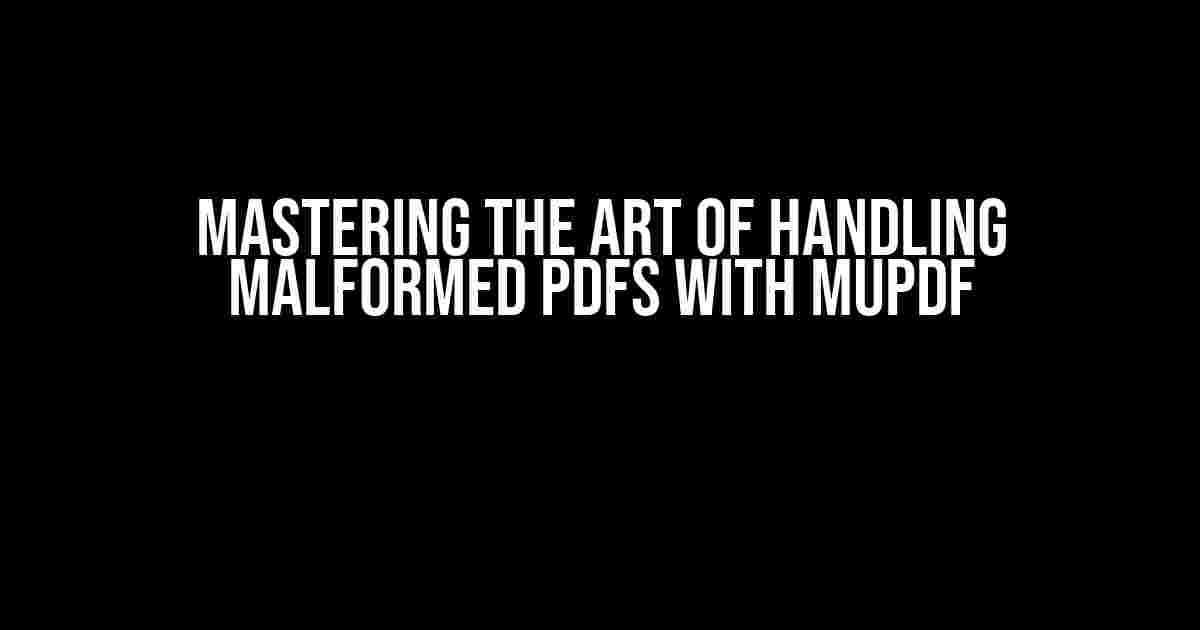When working with PDFs, you’ve probably encountered the frustration of dealing with malformed documents. Whether it’s a corrupted file or an incompatible format, malformed PDFs can bring your workflow to a grinding halt. But fear not, dear PDF wranglers! MuPDF, a lightweight and powerful PDF viewer, is here to save the day. In this comprehensive guide, we’ll explore the world of MuPDF and learn how to handle even the most troublesome of PDFs with ease.
What is MuPDF?
MuPDF is a lightweight, open-source PDF viewer and renderer that allows you to view, edit, and manipulate PDF files with precision and accuracy. Developed by Artifex Software, MuPDF is designed to be fast, reliable, and highly customizable. With its robust feature set and flexibility, MuPDF has become a go-to solution for PDF enthusiasts and developers alike.
MuPDF’s Advantage in Handling Malformed PDFs
So, what makes MuPDF particularly well-suited for handling malformed PDFs? The answer lies in its unique architecture and parsing algorithm. MuPDF’s parser is designed to be highly fault-tolerant, allowing it to detect and recover from errors in the PDF file structure. This means that even if a PDF is malformed or corrupted, MuPDF can often still extract usable data from it.
Getting Started with MuPDF
If you’re new to MuPDF, don’t worry – getting started is a breeze! Here’s a step-by-step guide to get you up and running:
- Download the MuPDF software development kit (SDK) from the official website (https://www.artifex.com/mupdf/).
- Choose the appropriate platform and architecture (Windows, macOS, Linux, etc.) for your needs.
- Unzip the downloaded archive and navigate to the `include` folder, where you’ll find the MuPDF header files.
- Copy the `mupdf` library and header files to your project directory.
- Include the MuPDF header file (`mupdf.h`) in your project, and start coding!
Handling Malformed PDFs with MuPDF
Now that you’ve got MuPDF set up, it’s time to dive into the juicy stuff – handling those pesky malformed PDFs! Here are some practical tips and code snippets to get you started:
Detecting Malformed PDFs
The first step in handling malformed PDFs is to detect them. MuPDF provides a range of error codes and debugging tools to help you identify issues with your PDF files. Here’s an example of how to use the `pdf_new` function to create a new PDF document and check for errors:
#include "mupdf.h"
int main() {
fz_context *ctx = fz_new_context(NULL, NULL, FZ_STORE_DEFAULT);
pdf_document *pdf = pdf_new(ctx, "path/to/malformed.pdf");
if (pdf == NULL) {
fprintf(stderr, "Error opening PDF: %s\n", fz_error_message(ctx));
return 1;
}
// Proceed with PDF processing...
return 0;
}
Recovering from Errors
When MuPDF encounters an error while parsing a PDF, it will return an error code indicating the nature of the problem. You can use these error codes to recover from errors and continue processing the PDF. For example:
int err = pdf_new(ctx, "path/to/malformed.pdf");
if (err == fz_ERR_PDF_CORRUPT) {
// Attempt to recover from corruption error
pdf_repair(ctx, pdf);
} else if (err == fz_ERR_PDF_UNSUPPORTED) {
// Handle unsupported features or formats
fprintf(stderr, "Unsupported PDF feature: %s\n", fz_error_message(ctx));
} else {
fprintf(stderr, "Unknown PDF error: %s\n", fz_error_message(ctx));
return 1;
}
Extracting Data from Malformed PDFs
Even if a PDF is malformed, MuPDF can often still extract usable data from it. Here’s an example of how to extract text from a PDF using MuPDF:
pdf_page *page = pdf_load_page(ctx, pdf, 0);
fz_text_page *text = fz_new_text_page(ctx);
fz_layout layout;
fz_begin_page(ctx, page, &layout);
fz_process_page(ctx, page, text);
fz_end_page(ctx, page);
char *text_buffer = fz_new_buffer(ctx, 1024);
fz_write_text(ctx, text_buffer, text);
printf("%s\n", text_buffer);
fz_drop_text_page(ctx, text);
fz_drop_page(ctx, page);
fz_free_buffer(ctx, text_buffer);
Advanced MuPDF Techniques
Now that you’ve got the basics covered, it’s time to dive into some more advanced MuPDF techniques for handling malformed PDFs.
Using MuPDF’s Error Handlers
MuPDF provides a range of error handlers that allow you to customize its behavior in response to errors. Here’s an example of how to set up a custom error handler:
void my_error_handler(fz_context *ctx, fz_error error) {
fprintf(stderr, "Custom error handler: %s\n", fz_error_message(ctx));
}
fz_set_error_handler(ctx, my_error_handler);
Optimizing MuPDF for Malformed PDFs
MuPDF provides a range of optimization options that can help improve its performance when handling malformed PDFs. Here are a few tips:
- Use the `pdf_set_option` function to enable or disable specific PDF parsing features.
- Use the `fz_set_cache` function to configure MuPDF’s caching behavior.
- Use the `fz_set_timeout` function to set a timeout for PDF parsing operations.
Best Practices for Handling Malformed PDFs
When working with malformed PDFs, it’s essential to follow best practices to ensure reliable and efficient processing. Here are some tips:
- Validate PDF files before processing to detect potential issues early.
- Use MuPDF’s error handlers to customize its behavior in response to errors.
- Implement robust error handling and recovery mechanisms to handle unexpected errors.
- Optimize MuPDF’s performance using the techniques outlined above.
- Test and verify your MuPDF-based application thoroughly to ensure reliability.
Conclusion
Handling malformed PDFs can be a challenging task, but with MuPDF, you’ve got a powerful tool at your disposal. By following the tips and techniques outlined in this article, you’ll be well on your way to mastering the art of handling even the most troublesome PDFs. So go forth, brave PDF wranglers, and tame those malformed beasts!
| MuPDF Function | Description |
|---|---|
| pdf_new | Creates a new PDF document |
| pdf_repair | Attempts to repair a corrupted PDF document |
| fz_error_message | Returns an error message for a given error code |
| fz_set_error_handler | Sets a custom error handler for MuPDF |
Remember, when working with malformed PDFs, it’s essential to stay vigilant and adapt to new challenges as they arise. With MuPDF and these expert tips, you’ll be well-equipped to handle even the most complex PDF-related tasks. Happy coding!
Frequently Asked Questions
Get answers to your burning questions about handling malformed PDFs with MuPDF!
What is a malformed PDF, and how does it affect MuPDF?
A malformed PDF is a PDF file that does not conform to the PDF specification, causing issues when trying to read or process it. MuPDF, being a robust PDF parser, can handle some malformed PDFs, but if the corruption is severe, it may lead to errors or crashes. MuPDF’s fault-tolerant design helps it recover from minor issues, but it’s essential to fix the underlying PDF problems for seamless processing.
How can I detect if a PDF is malformed before processing it with MuPDF?
You can use tools like `pdfformat` or `pdfinfo` to analyze the PDF’s structure and identify potential issues. MuPDF also provides APIs to check the PDF’s validity and report any errors or warnings. By integrating these checks into your application, you can detect and handle malformed PDFs before they cause problems.
What happens if I try to process a severely malformed PDF with MuPDF?
If the PDF is severely malformed, MuPDF might throw an exception or return an error code. In extreme cases, it could even crash. To mitigate this, MuPDF provides error-handling mechanisms, such as error callbacks and exception handling, which allow you to catch and handle errors gracefully. This enables you to provide a better user experience and recover from malformed PDFs.
Can MuPDF repair or fix malformed PDFs?
While MuPDF can handle some malformed PDFs, it’s not designed to repair or fix them. MuPDF focuses on parsing and rendering PDFs, not repairing or modifying their internal structure. If you need to repair PDFs, consider using specialized tools like `pdftk` or `pdfrepair` before processing them with MuPDF.
How can I ensure that my application is robust against malformed PDFs when using MuPDF?
To build a robust application, implement error handling and validation checks when working with MuPDF. Catch and handle exceptions, check for error codes, and validate the PDF’s structure before processing. You can also integrate PDF validation and repair tools into your application to ensure that only well-formed PDFs are passed to MuPDF for processing.


